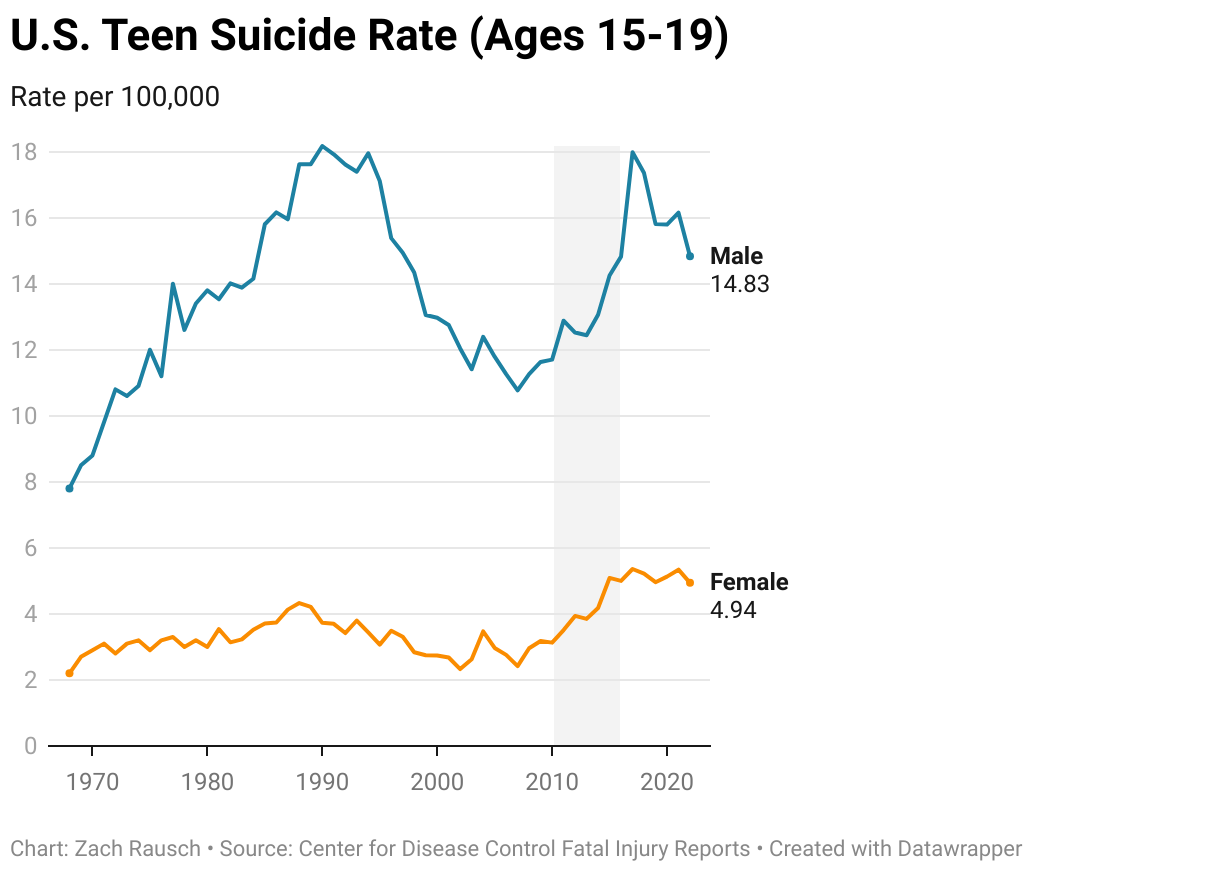The Overwhelming Truth About Young Men’s Mental Health
Why young men are struggling—and what we can do about it
It’s overwhelming when researchers and professionals start talking about you.
When you see statistics, reports, and headlines about the struggles young men face, it can feel like people are talking about you, not to you. It’s easy to get lost in the noise—another data point, another crisis, another study. But what if we talked with you instead?
The Story the Numbers Tell
The statistics are clear: young men are struggling.
A report from The Centre for Social Justice states: “Boys and young men are in crisis... In this generation, it is boys who are being left behind.”
Since the pandemic, the number of males aged 16 to 24 who are not in education, employment, or training has increased by 40%—compared to just 7% for females.
1 in 5 boys grow up without a father in the home, and fatherless boys struggle more with depression and antisocial behavior than girls in the same situation.
Suicide rates among teenage boys remain alarmingly high. According to data from the CDC, suicide rates for Gen Z girls have reached record-breaking levels, but boys are still dying by suicide at significantly higher rates.
The Story That’s Harder to See
Growing up, I was always more emotional, led by my heart when making decisions—whether it was about college, relationships, or friendships. This emotional nature has strengths, but it also comes with challenges, especially when it comes to handling difficult emotions.
I still remember one moment from elementary school—one that stuck with me. A girl on the playground made me mad, so I hit her.
Boy, did I learn that lesson fast.
Instant time-out. Detention. A talk with my teacher. Talks with my parents.
That kind of reaction isn’t uncommon. Young boys often express emotions through action—sometimes through violence or risk-taking. Getting into fights. Trying drugs. Punching a hole in the drywall.
And here’s the thing: when you punch a wall, you can replace the drywall. But when the pain runs deeper—when boys act exactly as expected, but in ways that can’t be undone—the consequences are permanent.
I know this firsthand. Three years ago, my brother Austin took his own life. He was just 16. His death made me realize how many boys struggle in silence, never learning how to navigate their emotions until it’s too late.
Little bit of a tangent here: You may have noticed that I switched platforms. This is not random. I am building a community around young men’s mental health, healthy masculinity, and vulnerability, and Substack is the place for community building.
We have already grown to 10,000 on LinkedIn and almost 1,000 directly receiving emails.
If you want to help me fight suicide and refine mental health for young men, consider joining me on Substack.
What Can We Do?
We have to start talking. More than that, we have to start listening.
If you’re a young man reading this, I want you to know: you’re not alone. You’re not weak for struggling. You’re not broken for feeling lost. And you don’t have to fit into the mold of what the world expects from you.
For those of us working with young men—parents, teachers, coaches, therapists—it’s time to rethink how we support them. We need to stop dismissing boys as “just being boys” and start equipping them with tools to handle emotions in ways that don’t lead to permanent consequences.
The first step is conversation. I hosted a discussion this week about this topic (details coming soon). And I want to hear from you:
What are you seeing in schools, workplaces, and families?
If you’re a young man, what do you wish people understood about your experience?
How can we do better?
Let’s keep this conversation going. Reply to this email or drop a comment.




I am so sorry. These comments, regarding the lack of others empathy is so painful to read for so many of us who are empathetic reader what you have written, but feel what you have wrote. It is so difficult to understand that sometimes the lack of empathy is indirectly towards themselves due to the lack of empathy they have received in the past so they normalize the lack of empathy not it passed on to you. A question or perhaps a direct contradiction to the lack of empathy is to conquer it with empathy. I am so sorry, Kathik. I am so sorry, your emotional pain is Not stupid, nor do we, our empathetic network want you to think you are dismissed. I do not dismiss you. You are real. A real human being asking to be understood. We can understand you. I am sorry you have only spoken to those who have not comprehended your pain for it is Not quiet but very loud. Can you express to us, what you did for enjoyment before pain took over? Can we all talk? I really believe, Karthik, you are very brave young man. I would like to be the first to tell you that because so many of us have similar struggles only you have brought the light in for all to read, think, feel, and write. We can and we shall start an empathetic network. Thank you for all of your caring. I hope others, who experienced the lack of empathy from others, join, and also start to share their stories.
People come at me "Why are you so quiet? You used to be so fun in school. What the hell happened?".
And when I tell them what happened and how I was suicidal and self-harming, they call me stupid or dismiss my struggles.
I don't even care about telling people why I am the way I am, anymore. What are they gonna do if I did?